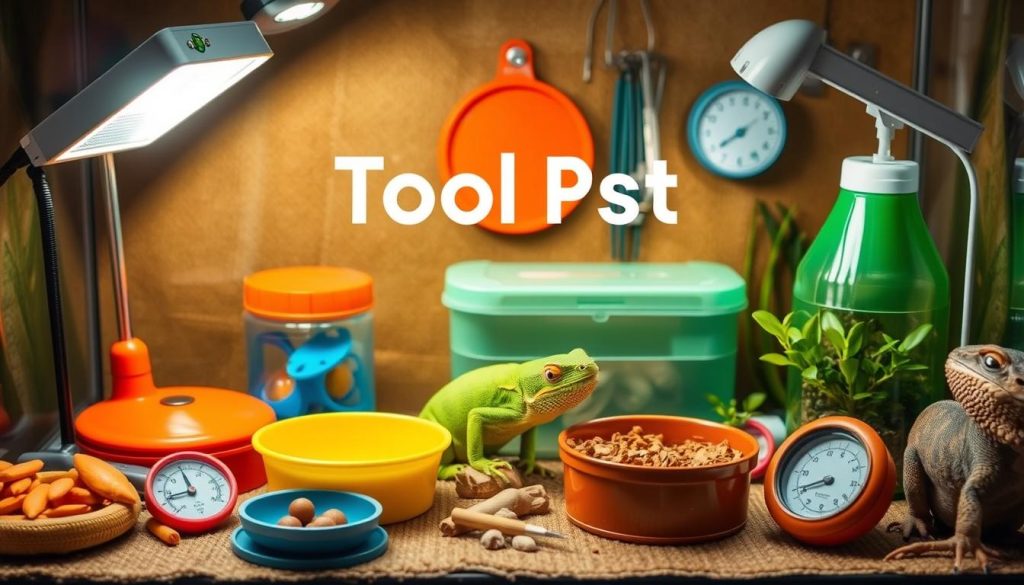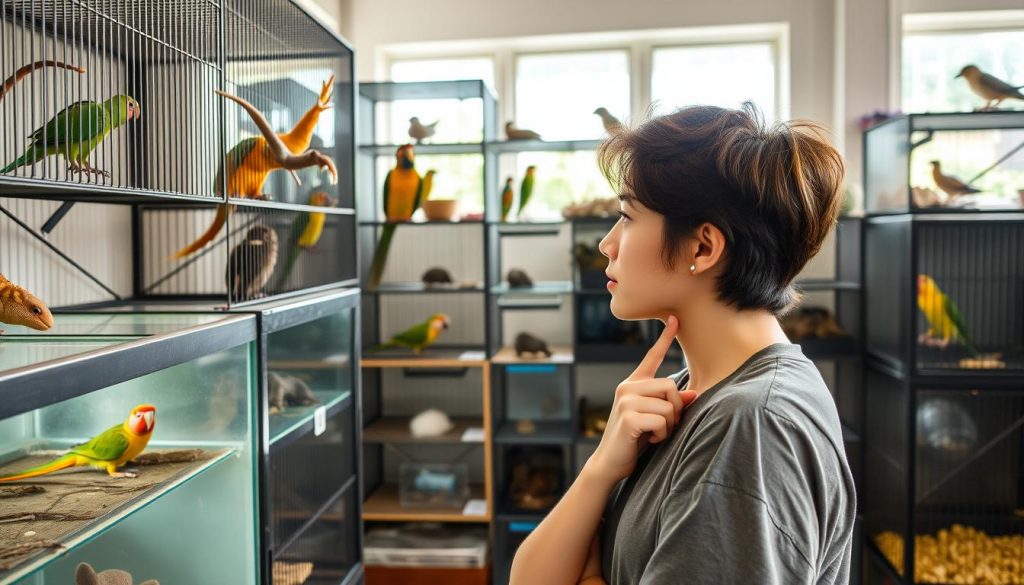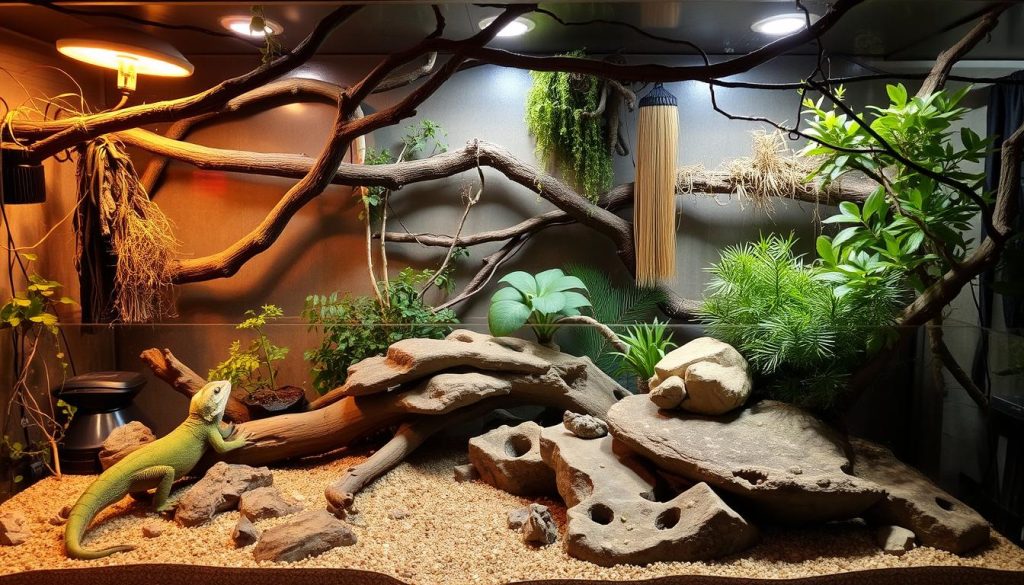Exotic pet care is essential for anyone looking to purchase an exotic animal as a pet. Sure, it has the potential to be incredibly rewarding, but there’s homework to do first. The exotic pet group of animals includes reptiles, birds, and small mammals, which are not commonly thought to be ‘domesticated.’ When you are still starting, it is already golden to know what they want. This includes their living conditions, the food they consume, how we take care of them, and the regulations regarding the same. The ownership of pets is very important to the pets themselves as well as to your well-being.
This comprehensive guide is full of tips for new exotic pet owners. It covers everything from picking the right pet to setting up a good home for it. You’ll see the unique challenges and rewards of exotic pet care. Knowing what it takes helps you make a good choice and care for your new friend well.
Key Takeaways
- Research the specific needs of your chosen exotic pet before making a commitment
- Ensure you can provide an appropriate habitat and meet dietary requirements
- Find a veterinarian specializing in exotic pets for regular check-ups and emergencies
- Understand the legal considerations and regulations surrounding exotic pet ownership
- Provide proper socialization and handling to build a strong bond with your pet
Understanding Exotic Pets
The world of exotic pets is exciting and fulfilling to explore. However, it is important to understand what makes a pet exotic and the special challenges and benefits they bring. Learning about exotic pet care helps you decide if one is right for you.
What Qualifies as an Exotic Pet?
Exotic pets are not the ordinary pets that need special attention. They contain a range of species such as:
- Reptiles: Reptiles: Iguanas, pythons, bearded dragons, and geckos are popular among reptile enthusiasts. They require proper care of reptiles, such as proper temperature and diet.
- Birds: Parrots, toucans, and other exotic birds are intelligent and social. They also require a lot of bird handling and interaction to excel.
- Small Mammals: Sugar gliders, hedgehogs, and chinchillas are exotic pets. Both of them have their own small mammal diets and the living requirements.
Advantages and Challenges of Owning Exotic Pets
Exotic pets have pros and cons, and you should think about these before you decide.
| Advantages | Challenges |
|---|---|
| Unique and fascinating companions | Specialized dietary needs |
| Chance to learn about different species | Needs for a specific environment |
| Potential for strong bonds with owners | Finding vet care can be hard |
| Conversation starter and educational tool | Legal issues and permits in some places |
Before getting an exotic pet, research its needs and think about if you can give it the right care, time, and money.
Knowing exotic pets’ characteristics enables you to make a wise decision. This way, you can ensure that you can solve the problem. Give your exotic pet a happy, healthy life.
Research and Preparation
When you bring an exotic pet home, it is important to do some research. Please find out the pet’s natural habitat, behavior, diet, and health requirements. This will assist you to come up with a great home and how to take care of your pet.
Preparation before acquiring an exotic pet includes preparation of a good home, purchase of what is needed, and a vet who is familiar with exotic animals. The Manual of Exotic Pet Practice has some tips on other so-called exotic pets, such as their biology and health.

Also, research on the local laws regarding keeping exotic pets. Some pets require special permits or have special homes. Failure to adhere to these rules will not only result in legal complications, but also the forfeit of your pet.
“The research and preparation are the most important things to know about successful exotic pet ownership. Knowledge of your pet’s needs and how to create an appropriate environment will put you in a good position to give your pet a happy and healthy life.“
Online forums, books by experts, and discussions with other exotic pet owners can help you a lot. These resources will enable you to prepare yourself against challenges and to learn about other people.
Before going to get an exotic pet, consider the following points:
- Housing and enclosure needs
- Temperature, humidity, and lighting control
- Diet and nutrition
- Enrichment and exercise needs
- Veterinary care and emergency plans
By looking into these areas during your research, you’ll be ready to give your new pet a great life. This will also help avoid health problems.
| Exotic Pet | Minimum Enclosure Size | Temperature Range | Humidity Range |
|---|---|---|---|
| Green Iguana | 6′ x 3′ x 6′ | 75-85°F (basking area up to 95°F) | 60-80% |
| African Grey Parrot | 3′ x 2′ x 4′ | 65-80°F | 50-70% |
| Bearded Dragon | 55-gallon tank (for adult) | 75-85°F (basking area up to 100°F) | 30-40% |
Choosing the Right Exotic Pet for You
There’s a lot to consider when picking the perfect exotic pet. You should consider your own life, where you live, and how much attention you can devote. This will make you and your new pet have a happy life.
Factors to Consider When Selecting an Exotic Pet
Consider the following when choosing an exotic pet:
- Living space: Ensure that you can accommodate your pet in terms of space.
- Time commitment: Consider how much time you will be able to devote to your pet, such as feeding, cleaning, and playing.
- Financial resources: Think of the expenses of acquiring the pet, preparing its environment, and the expenses of sustaining it, such as food and veterinary fees.
- Experience level: Make sure you have enough knowledge of exotic pet care. Some need special care. Others require special treatment.
One should consider the compatibility of an exotic pet with you. Choose a pet that best fits your personality and lifestyle to have a good bond. In this case, you should consider the example of travelling a lot, so you need to get a pet that does not require a lot of attention daily, such as some reptiles.

Popular Exotic Pet Options
There are many exotic pets to choose from, each with its own needs. Some popular ones are:
| Pet Category | Examples | Key Characteristics |
|---|---|---|
| Reptiles | Leopard geckos, bearded dragons | They are usually easy to care for but need a special home. |
| Birds | Cockatiels, budgerigars | They are smart, love to talk, and need space to fly. |
| Small Mammals | Rabbits, guinea pigs | They are friendly, need a big cage, and like to move around. |
Research as much as you can about a pet before you choose an exotic pet. Be aware of what it feeds on, where it resides, and its health care requirements. This will assist you in making a good decision and giving a lot of care to your new friend.
It is a significant commitment in life to make the right decision on which exotic pet to choose. Consider how you would suit various pets and their requirements. In this manner, you will be able to get a pet who will be happy with you and who will make your life happier.
Housing and Environment
When you take an exotic pet home, it is important to make an appropriate habitat so that they can be healthy and happy. Their natural home should be an excellent habitat, and they should feel at home in a comfy and interesting place to live. It is possible to make your pet’s home both functional and entertaining by knowing what your pet requires.
Creating the Ideal Habitat for Your Exotic Pet
To create the ideal environment where your exotic pet will live in, research about their habitat and attempt to replicate it. This entails providing them with the appropriate type of ground, temperature, humidity and light. For example, reptiles such as bearded dragons require a warm place, a cooler place, and UVB light to remain healthy.
Birds like parrots and finches are good in large aviaries where there are perching spots, toys, and freedom to move around.

In the case of the pets that live in water, such as fish and turtles, you will require a well-filtered tank with heat and light to keep the water warm and clean. They have a lovely and natural-looking home, which is achieved by adding plants, rocks, and decorations.
Essential Equipment and Supplies
There are some other things that you will also require to make your exotic pet happy and healthy. These include:
- Food and water dishes
- Hiding spots and shelters
- Climbing structures and perches
- Heating and lighting elements
- Substrate and bedding materials
- Environmental enrichment items, such as puzzles and chew toys
Maintaining your pet’s home’s cleanliness is a major way of preventing diseases and ensuring their health. This involves cleaning up as one goes, changing beddings, and cleaning things up with the use of disinfectants.
| Exotic Pet | Habitat Type | Essential Equipment |
|---|---|---|
| Bearded Dragon | Terrarium | Basking lamp, UVB light, thermometer, hiding spots |
| African Grey Parrot | Aviary | Perches, toys, food and water dishes, nesting box |
| Red-Eared Slider Turtle | Aquarium | Basking platform, water heater, filter, UVB light |
Creating a comfortable and fun place to live by giving your exotic pet the best home and the best stuff will make them feel good. Make sure you do your homework on what your pet needs and talk to experts to ensure you are doing a great job.
Diet and Nutrition
To have a long-lived and healthy animal, you must properly feed your exotic pets. All kinds of pets require a special diet. It’s important to pick food that fits their needs.
Many exotic pets require a specialized diet, such as pellets in the case of birds or insects in the case of reptiles. You should know what your pet needs and consult a vet. Certain pets may require additional supplements, such as calcium in the case of reptiles or vitamins in the case of birds. However, never add supplements without consulting a vet, because excessive supplements are harmful.
In the case of exotic pets, it is best to feed them a variety of foods. This will assist in ensuring that they are provided with all the nutrients. For instance:
- Reptiles might eat veggies, fruits, and things like insects or mice.
- Birds do well on seeds, pellets, fruits, and veggies.
- Small mammals, like rabbits and guinea pigs, need lots of fiber, with hay being key.
It’s also important to know which foods are bad for your exotic pet. Some foods can be toxic, like:
| Exotic Pet | Toxic Foods |
|---|---|
| Birds | Avocado, chocolate, caffeine, alcohol |
| Reptiles | Citrus fruits, spinach, kale |
| Small Mammals | Onions, garlic, chocolate, sugary treats |
Nevertheless, it is always good to research and talk to a vet specializing in exotic pets to ensure you are feeding your special pet the best possible diet.
Concentrating on the correct nutrition for your pet, you can make your pet live a long life with you
Health Care and Veterinary Needs
As an exotic pet owner, one of the most important things to ensure is that the pet receives the appropriate health care. There are medical needs that are unique to them, and they need qualified vets. We will inquire about how to find the appropriate vet to take care of your exotic pet, general problems, and care advice.
Finding a Veterinarian Specializing in Exotic Pets
Veterinarians don’t always know how to care for exotic pets. The vets who specialize in exotic pets receive additional training to learn about the special needs of these animals. The following are the steps on how to get the best vet for your pet:
- Seek exotic pet veterinary clinics in your locality.
- Get recommendations of the vet by asking other exotic pet owners or the local pet stores.
- Meet with the vet to talk about your pet’s needs before any health problems start.
Your pet’s health is important when you take your pet to an expert vet regularly. They assist in identifying the problems early.
Common Health Issues and Preventive Care
There are various health problems of exotic pets. Some of them are common as follows:
- Reptiles: metabolic bone disease, respiratory infections, parasites
- Birds: respiratory infections, nutritional deficiencies, feather plucking
- Small mammals: dental problems, gastrointestinal issues, skin conditions
To prevent these issues, follow a good preventive care plan:
| Preventive Care Measure | Description |
|---|---|
| Regular grooming | Keep your pet’s coat, skin, or scales clean with regular grooming |
| Nail, beak, or tooth maintenance | Trim nails, beak, or teeth to prevent overgrowth and related problems |
| Proper diet | Feed your pet a balanced diet that’s right for their species |
| Environmental maintenance | Keep your pet’s home clean and safe from dangers |
| Regular check-ups | Visit your vet regularly to check on your pet’s health and catch problems early |
An ounce of prevention is worth a pound of cure, especially for exotic pets.
Your exotic pet can have a long and healthy life with the assistance of a special vet and a sound preventive care strategy.
Handling and Socialization
Your pet will depend on how well he is handled and socialized as an exotic pet. They also contribute to the establishment of a good relationship between a pet and you. With the proper techniques learned and some socializing, it is possible to make your exotic pet happy, healthy, and well-adjusted.
Proper Handling Techniques for Different Exotic Pets
Every exotic pet has its own set of handling needs. One should find out how to treat his pet in the best possible manner. For example, reptiles like lizards and snakes require a soft, confident approach to feel safe. Birds need light, and their feet have to be supported. Small animals, such as hedgehogs or sugar gliders, also have their preferences regarding whether to be held or petted. When you do your research and practice the right ways to handle your exotic pet, you can make sure that your pet will not be uncomfortable and safe.
Socializing Your Exotic Pet
Socialization is essential to the social animals including birds and some small mammals that are termed as exotic pets. Exposing your pet to strangers, other pets, and environments makes him or her grow up to be a confident and well-balanced pet. It can be achieved through:
- Inviting friends and family to interact with your pet under supervision
- Taking your pet to safe, controlled places like pet stores or veterinary offices
- Encouraging positive interactions with other animals of the same species, if appropriate
Socialize your exotic pet according to your pet’s pace and be sure to respect your pet’s comfort level. Use positive reinforcement training to help your pup learn commands and tricks and encourage them in socialization. This approach incorporates treats, praise, or other rewards for good behavior, which makes the learning fun and enjoyable for you and your pet. With appropriate handling and socializing as well as training, you can provide your exotic pet with the care they need to flourish and form a solid relationship with them.
Exotic Pet Guide: Legal Considerations and Regulations
Having a pet that is considered exotic means you have special duties. You need to understand exotic pet laws, permits, and licenses. The most important thing to do is to read up on the legislation in your region and the type of pet you desire. Failure to adhere to these laws may result in a fine, the loss of your pet, or even legal issues.
As a responsible owner, it is not enough to take care of your exotic pet. It also implies the adherence to the laws. This will make your pet safe and will keep your community safe. What are some of the legal considerations that should be made by exotic pet owners? Let us consider some of them:
- Research local, state, and federal exotic pet laws before getting your pet
- Get the permits and licenses you need for your exotic pet
- Make sure your pet’s home meets all legal standards for size, safety, and security
- Keep records of your pet’s background, health, and any needed documents
- Know about any changes in exotic pet laws in your area
Some exotic pets are banned in certain places, while others need special permits. For example, fennec foxes might be okay in one state but not another. Hedgehogs might need a permit in some places to be pets.
“As an exotic pet owner, it’s your job to learn about the laws and rules for your pet. By staying informed and following the rules, you can have a great bond with your pet and support responsible pet ownership.”
It’s important to keep up with changes in exotic pet laws. Laws can change, and what’s okay now might not be later. Joining groups for exotic pet owners or checking with local animal control can help you stay updated.
| Exotic Pet | Legal Status | Permit Required |
|---|---|---|
| Hedgehog | Legal in most states, banned in a few | Yes, in some cities and counties |
| Fennec Fox | Legal in some states, banned in others | Yes, where legal |
| Axolotl | Legal in most states | No, but permits may be needed for import or export |
| Sugar Glider | Legal in most states, banned in a few | Yes, in some states |
By focusing on legal rules, care, and proper care, exotic pet owners can enjoy their unique pets. This helps make the exotic pet industry more responsible and sustainable.
Conclusion
Getting into exotic pet ownership is very rewarding. It allows you to forge a connection with a singular beast. But! It comes with great responsibility.
Please research, prepare, and give your pet the care it requires. In so doing, you can maintain your exotic pet healthy and happy.
Responsible pet care implies that you take care of your pet throughout his or her life. You have to give them a place where they feel that it is their natural environment. Provide a well-balanced diet, frequent vet care, and socialising and entertainment opportunities.
Consider the time, effort, and money required to keep an exotic pet. They often require more care than typical pets. Understanding the risks and difficulties of owning an exotic pet is critical to making an intelligent selection.
That was our guide, we hope we have helped all these future exotic pet owners with some cool tips and info! You can develop an excellent relationship with your exotic pet through education, preparation, and determination to be responsible in caring. Make the best decision in terms of your pet.
An exotic pet can be a very nice pet to have with love, devotion, and proper care. This will guarantee their health and happiness for an extended period.
FAQ
What is considered an exotic pet?
Exotic pets are animals that are not common pets. This comprises reptiles, small mammals, and birds. They require special attention due to the fact that they are not tamed.
What should I consider before getting an exotic pet?
Consider your living conditions, time, money, and experience before bringing home an exotic pet. Find out what the pet needs to be healthy and happy -housing, food, health care, and the law. That way, you can provide the very best care.
How do I choose the right exotic pet for me?
Choose an unusual pet that matches your temperament and lifestyle. Consider the animal’s size, life span, and care requirements. Read up on reptiles, birds, and small mammals, but find out what each requires.
What kind of housing does an exotic pet require?
Exotic pets need homes that feel like their natural habitats. This means the right substrate, temperature, humidity, and lighting. The type of home varies by species, like terrariums for reptiles or aviaries for birds. Make sure it’s clean and has the right equipment.
What should I feed my exotic pet?
Each exotic pet has its own diet needs. Some eat special foods or insects. Do your research, talk to a vet, and give any supplements as advised.
How do I find a veterinarian for my exotic pet?
Find a vet who knows about exotic pets, especially your type. Get to know them before you need their help. Regular check-ups and care keep your pet healthy.
How should I handle and socialize my exotic pet?
Learn how to handle your exotic pet safely and comfortably. Socializing is key for many, like birds and some small mammals. Use positive training to teach good behaviors and bond with your pet.
Are there legal considerations when owning an exotic pet?
Yes, there are laws about exotic pets. Check the laws in your area for your pet. Some pets may not be allowed or need special permits. Following the laws is important for caring for your pet.
What supplies do I need for my exotic pet?
The supplies you need depend on the pet. This can include a habitat, lighting, heating, substrates, dishes, hiding spots, and toys. Think about what your pet needs to be happy and healthy.
How can I ensure the health and well-being of my exotic pet?
Keep your exotic pet healthy by feeding them right, keeping their home clean, and seeing a vet regularly. Watch for illness, prevent it when you can, and keep your pet happy with socialization and toys.
